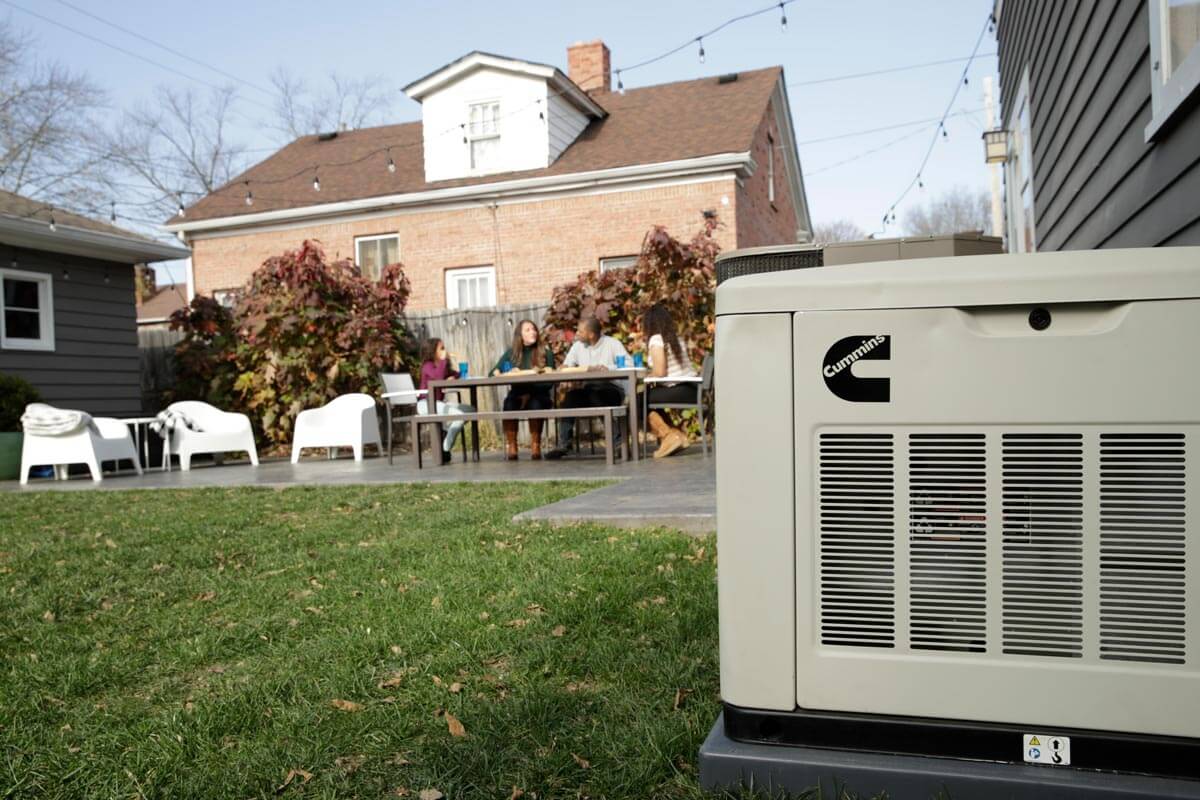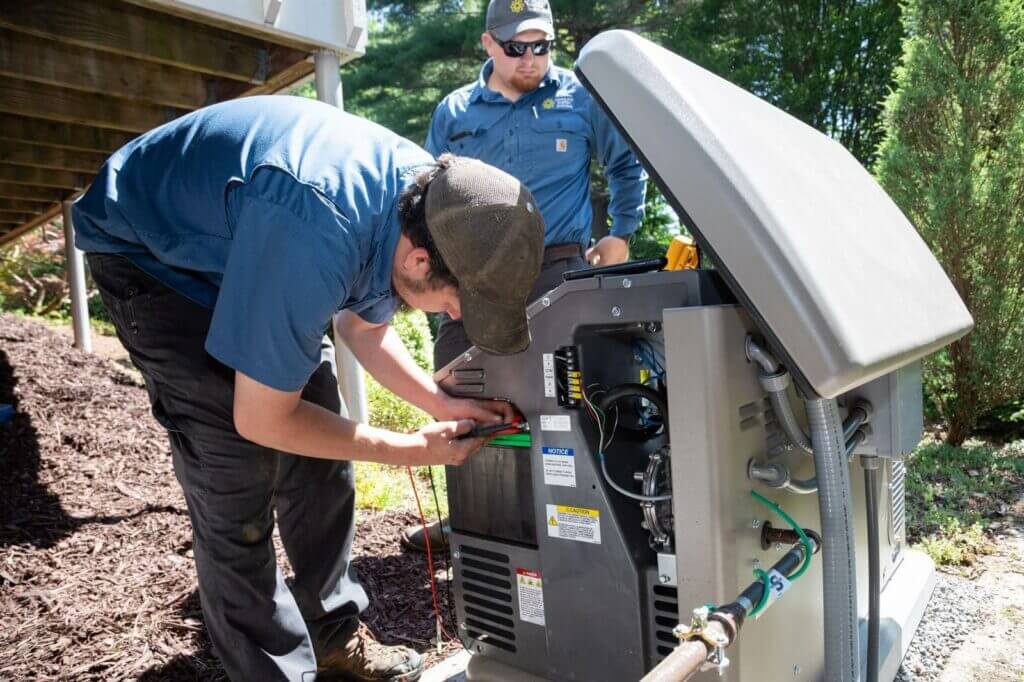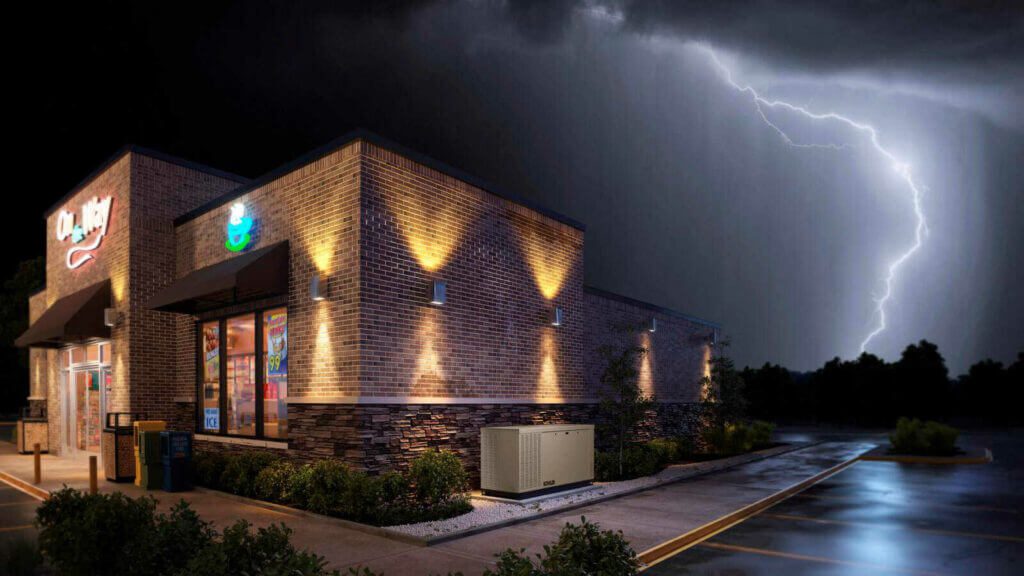An occasional power outage lasting less than an hour is usually not a problem. It will require some patience, and maybe a flashlight or two. However, major, unexpected power outages—whether they are caused by snow & ice, thunderstorms, floods, another natural disaster, or a human accident—can last for much longer and require more thoughtful preparation if you’re going to keep your family warm, dry, and fed.
When it comes to emergency preparedness, investing in a backup generator just makes sense. If your home loses power unexpectedly, there is no guarantee when it will come back on. That’s why an emergency generator is an invaluable asset when it comes to keeping your house feeling like a home. Prevent costly food waste and interior home damage while maintaining climate control and comfort for your family with the help of an emergency home generator.
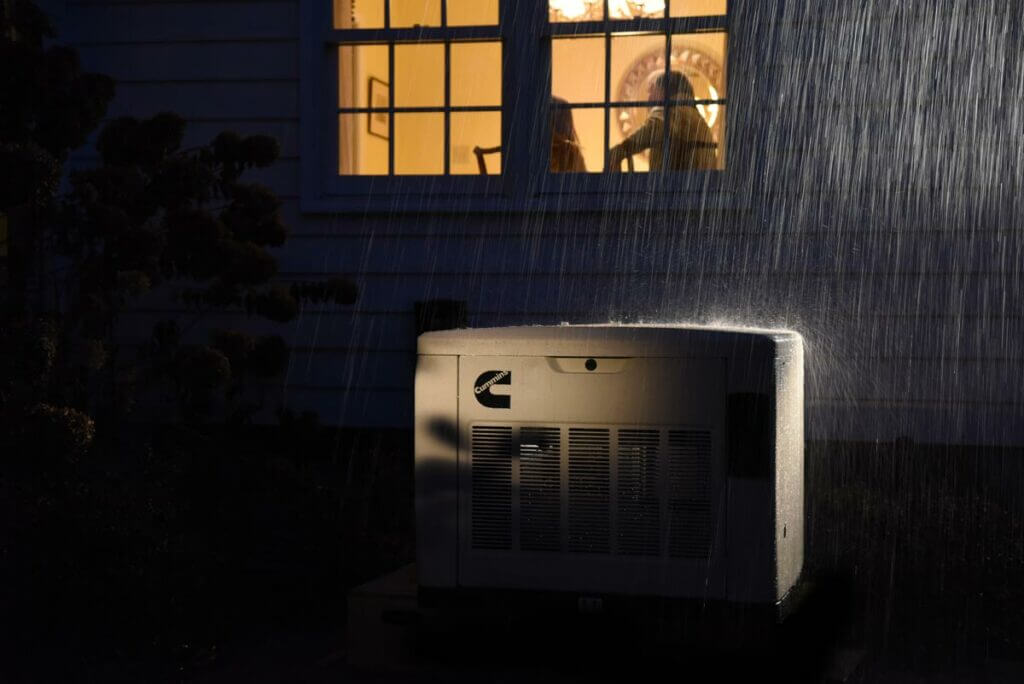
Emergency Generators Keep Appliances Running & Food Safe
When the electricity goes out due to a major storm or power company outage, it’s natural for our thoughts to go right to one of our most basic needs: food. Our minds start racing: How will I make dinner to feed my family without a stove, oven, or microwave? How long before the food in the refrigerator starts to go bad? How long until the food in the freezer thaws? How much food and money will go to waste if this power outage lasts longer than just a couple of hours?
But if you’ve had a standby generator installed for unexpected emergencies just like this, you won’t have to worry.
Typically, food can stay fresh in an unopened refrigerator for up to 4 hours, while food that is kept in an unopened freezer can last an average of 36 hours. However, this number fluctuates depending on the time of year and climate, the type of food, and the quality of the appliances. And most food, once thawed, can not be safely refrozen. This means, without a generator, you’re left with two options at the tail end of these time frames: cook up a feast so your food and money don’t go to waste or toss what’s no longer safe to consume and spend more money to stock up again.
By investing in the installation of a home standby generator, you have a third option—one that keeps your mind at ease, your food fresh, and your family fed during an unexpected power outage.
Many generators for the home can provide enough power to keep essential appliances like refrigerators, microwaves, slow cookers, and Instant Pots in commission until the electricity comes back on. This means that even in an extended power outage, your food will stay fresh and your family can enjoy a home-cooked meal together.
Emergency Generators Prevent Interior Home Damage
In addition to keeping your food from spoiling, home standby generators are a great way to protect your home and electronics in the event of an unexpected power outage. Standby generators provide a continuous, reliable source of backup power during a blackout, ensuring that electrical appliances and systems remain running, and preventing potential damage from occurring due to flooding, surges, or fluctuations.
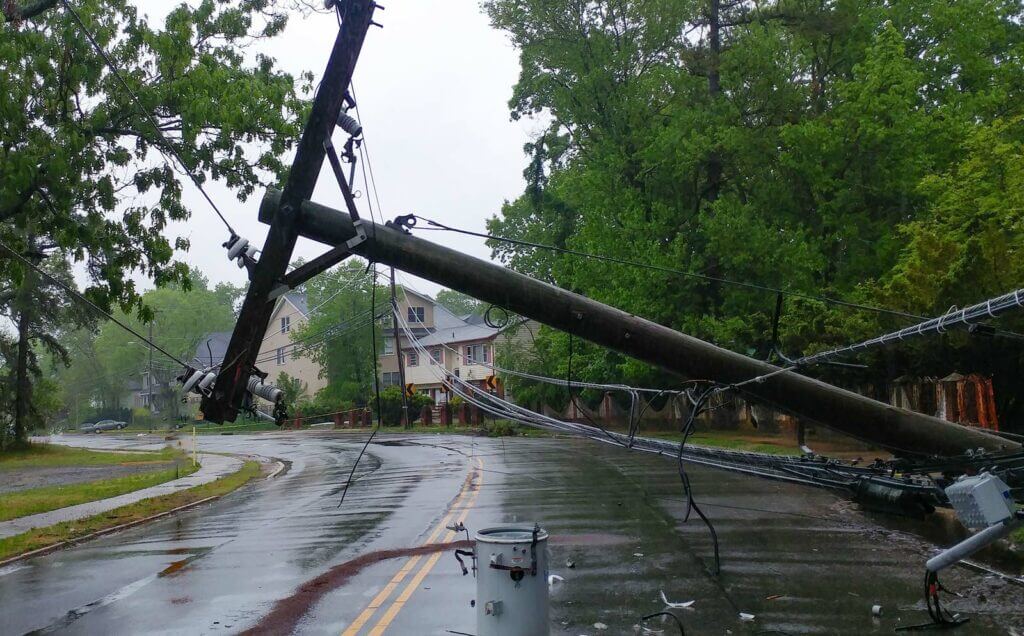
In addition to keeping your food from spoiling, home standby generators are a great way to protect your home and electronics in the event of an unexpected power outage. Standby generators provide a continuous, reliable source of backup power during a blackout, ensuring that electrical appliances and systems remain running, and preventing potential damage from occurring due to flooding, surges, or fluctuations.
If you live in an area that is prone to hurricanes or other severe weather events, having a generator can be a lifesaver in case of flooding. Flooding can damage a house in a number of ways, the most common of which is water seeping into the foundations and causing the structure to weaken and eventually collapse. Basements are often the first places that flooding takes place, and if not addressed quickly, basement water damage can be extensive and costly. Mold can also grow in areas that have been flooded, leading to further health concerns for your family members.
An emergency generator can provide power to your home’s sump pump, which diverts water that enters your basement and helps prevent accumulation, mold, and other water damage. Additionally, a generator can be incredibly helpful in preventing pipes from bursting and causing internal home damage during a prolonged power outage. When the electricity goes out, so does the heat. Without a generator to keep the temperature within an acceptable range in your home, frozen water can burst through your pipes and cause major water damage. With a generator, you are able to keep your home heated and reduce the risk of your pipes bursting.
Emergency generators can also help reduce the risk of home fires, as the generator will keep essential home systems like HVAC running, preventing the build-up of heat and smoke that can occur when power is lost. This is especially important during the colder months when fireplaces and space heaters are in use more often.
Finally, emergency generators can help protect valuable electronics from damaging surges or spikes by providing a consistent source of power. This is important for items such as a computer, TV, and other sensitive equipment that can be easily damaged by sudden electrical fluctuations.
Emergency Generators Help Maintain Climate Control & Comfort
Whether an unexpected power outage occurs in the winter or the summer, emergency generators provide a reliable source of electricity to keep essential heating and cooling systems running, including furnaces, air conditioners, and other climate control elements.
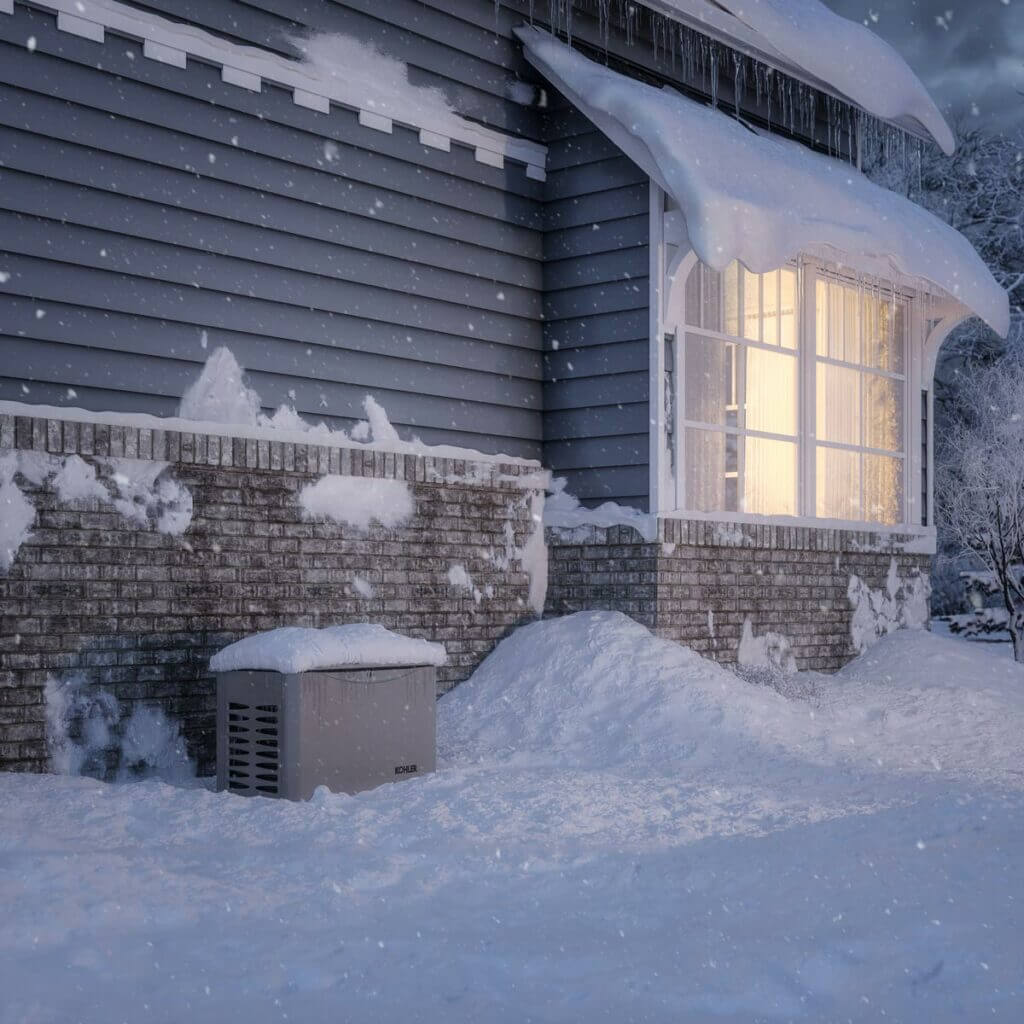
For some, staying warm in the cooler months and cool in the warmer months is essential for comfort. For others, especially for the youngest and oldest members of your household, having a functional heating system or air conditioner can mean life or death.
Additionally, home standby generators can keep humidifiers or dehumidifiers running for those spaces in your home that need to be kept at a certain humidity level—whether for the benefit of pets, plants, loved ones, art, or that prized baseball card collection.
How To Determine The Best Emergency Generator For Your Home
When you’re ready to invest in a generator to protect your home and family in case of an emergency, there are a few key things to consider that will ensure you choose the right generator for your needs.
Standby Generators vs. Portable Generators
When it comes to supplying power to the essential appliances in your house in the case of unexpected power outages, standby and portable generators are the two most popular solutions for homeowners.
One of the main differences between the two is that a standby generator needs to be professionally installed onsite and integrated into your home’s electrical system, whereas no installation is required for a portable generator. Standby generators are also automatic, starting when the power goes out. Portable generators need to be started manually and connected to appliances by an extension cord.
While portable generators can’t accommodate nearly as many power needs as standby generators, the latter still require an expert to determine what size generator you need based on home size, power needs, and electrical load. Just as easily as you can install too small of a standby generator for your home, you can also install too large of a generator for your breaker box.
Standby generators also offer a much longer lifetime than portable generators, as they’re typically serviced and maintained via an annual service agreement with your installer. Portable generators, on the other hand, require manual maintenance by the owner, which can easily become costly over the lifetime of the generator.
Fuel Source
Most standby generators are powered by natural gas, propane, or diesel. Because they are installed and more permanent than portable generators, they can be hooked up to your home’s gas line. This also means that there is no need to refuel a standby generator.
Portable generators are typically powered by gasoline. Because they are not permanently installed nor connected to a replenishing power supply, portable generators must be refueled, which means you may have to use your portable generator more sparingly than you would a standby generator, or risk running out of fuel before the power returns. These generators burn through gas rather quickly, and within 6-8 hours can burn through their entire gas tank.
Size, Wattage, & Power Output
Generally, home standby generators are larger and can therefore generate more power than portable generators. There are also different sizes of portable and standby generators, which can affect the amount of electricity they can provide.
If you are looking to generate enough electricity to power a portion of your home or the entire home, a standby backup generator is your best bet. Standby generators can keep electricity flowing through your system during a power outage to keep your lights, HVAC systems, and essential appliances in use when you need them most.
While portable generators cannot generate as much power as an installed standby generator, they come in multiple sizes including 1,000-5,000 watts, 6,000-8,000 watts, and 10,000-17,500 watts. These range from providing power for the most basic appliances necessary for your survival to powering multiple rooms, too. However, some home fixtures, like backup heating strips, can easily overload a portable generator on their own.
Invest In An Emergency Generator For Your Home Today
Save your future self the stress and start preparing for the next power outage that comes your way. With the right emergency home generator, you can rest easy knowing that you’ll have power even when the lights go out.
Not only can our generator experts help you decide which type of generator best suits your home’s needs, but we’ll also deliver, install, and help maintain it.
Reach out today to speak with one of our experts about installing an emergency generator in your home.

